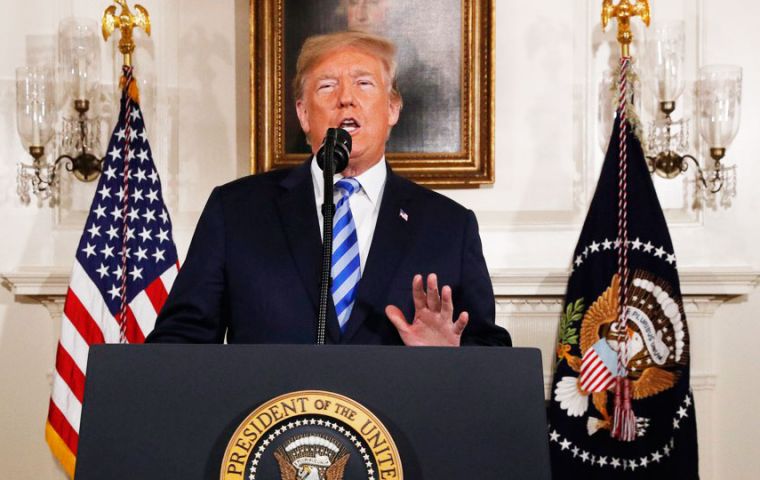MercoPress. South Atlantic News Agency
Latin American (and global) currencies hit by strong dollar and Trump's policies
 The market’s attention was on President Donald Trump’s decision to withdraw from the international nuclear agreement with Iran, a deal which eased economic
The market’s attention was on President Donald Trump’s decision to withdraw from the international nuclear agreement with Iran, a deal which eased economic The dollar hovered near a four-month high on Tuesday, continuing to draw support from higher Treasury yields and upbeat prospects for the U.S. economy, leaving its major rivals such as the Euro struggling and other Latin American currencies including the Argentine peso down sharply.
The market’s attention was on U.S. President Donald Trump’s decision to withdraw from the international nuclear agreement with Iran, a deal which eased economic sanctions in exchange for Tehran limiting its nuclear program. Trump anticipated sanctions would be impose immediately.
Diminished market concerns over perceived risks from the U.S.-China trade spat and North Korea, have helped shift investor focus back on dollar-supportive fundamentals over the past month.
“While a U.S. withdrawal from the (Iran) deal may be a dollar-negative theme, but at least for the short term it is hard to ignore the dollar’s broad strength, particularly against emerging market currencies like the Argentine peso,” said Yukio Ishizuki, senior currency strategist at Daiwa Securities in Tokyo.
The dollar dipped was flat at 109.090 yen after going as high as 109.400 overnight. The yen is often sought in times of political tensions and market turmoil. The dollar index against basket of six major currencies was 0.1% higher at 92.864 after reaching 92.974 overnight, its highest since Dec. 28.
The greenback received its latest boost as the euro sank below US$1.19 for the first time this year the previous day in the wake of weaker-than-forecast data on German industrial orders and euro zone investor sentiment. The euro was effectively flat at US$ 1.1920 after plumbing US$ 1.1897 the previous day, its lowest in more than four months.
Rising U.S. Treasury yields and solid economic data have bolstered the dollar in recent weeks. While Friday’s U.S. payrolls data came in mixed, underlying strength in the labor market backed expectations of steady rate increases by the Federal Reserve. Indeed, monetary policy normalization in the United States, which has moved significantly ahead of other countries, has been a major dollar-supportive factor.
Persistent concerns over rising U.S. interest rates kept up the relentless sell-off in Latin American currencies overnight, with the Mexican, Chilean and Argentine pesos all falling more than 1%
The Argentine peso, which regained some of the ground it had lost earlier in the day, closed down 2.79% at 22.6 pesos per U.S. dollar after touching an all-time low of 23.5 to the greenback during the session. So far this year the Peso has lost 15/16% of its value. Argentina's Merval stock index also pared losses.
Currencies ended weaker on Tuesday across Latin America, as investors drive away from high-yielding assets, already under pressure from growing expectations of higher U.S. interest rates.
Brazil's real was down 0.47% and 7.16% so far this year. Likewise the Mexican peso lost 0.58% and 0.64%;the Chilean Peso, was down 0.79% and 3.03%; the Colombian Peso, 1.75% but up 3.89% so far this year, while the Peruvian Sol slid 0.30% and 1,55%.
Emerging market currencies have taken a hit in recent weeks as investors have shed high-yielding assets on expectations that accelerating U.S. inflation and a widening fiscal deficit could force the Fed to tighten policy at a quicker pace.




Top Comments
Disclaimer & comment rules-

-

Read all commentsOf course, Argentina has by far suffered the greater effects of the U.S. interest rates hike.
May 10th, 2018 - 12:35 am 0The economic measures taken by president Mauricio Macri in the last 30 months have made the country extremely vulnerable to events that it cannot control.
As a result, private investors have stopped lending dollars to Argentina, prompting the country to seek a line of credit from the IMF.
Some managers.
The Bubble WILL burst - sooner OR later.
May 14th, 2018 - 06:40 pm 0Commenting for this story is now closed.
If you have a Facebook account, become a fan and comment on our Facebook Page!